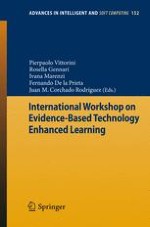Research on Technology Enhanced Learning (TEL) investigates how information and communication technologies can be designed in order to support pedagogical activities. The workshop proceedings collects contributions concerning evidence based TEL systems, like their design following EBD principles as well as studies or best practices that educators, education stakeholders or psychologists used to diagnose or improve their students' learning skills, including students with specific difficulties.
The international ebTEL’12 workshop wants to be a forum in which TEL researchers and practitioners alike can discuss ideas, projects, and lessons related to ebTEL. The workshop takes place in Salamanca, Spain, on March 28th-30th 2012.
